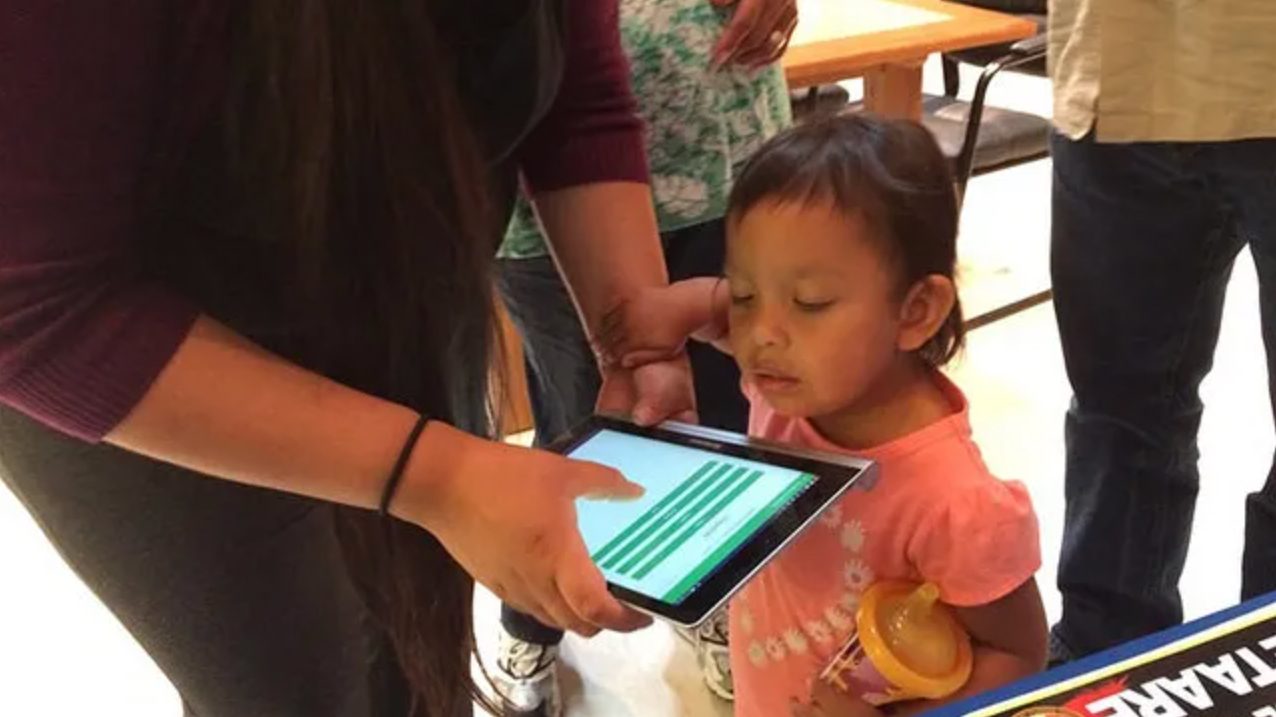Bloomington organization fights to save Native American languages
As the number of speakers of Native American languages drops, many are fighting to teach the languages to more people.
Kara Berg | IndyStar | June 6, 2016

A young girl tests out the Hidatsa vocab builder during the MHA Summer Institute 2015. Photo provided by Yuliya Manyakina
When a language disappears, so does the culture of its people.
Many Native American tribes face the troubling prospect of losing every song, story, value and piece of history once the few remaining speakers of their languages die.
One of those languages, Arikara, has no native speakers left. The only reason the language survives is because some people are now learning to speak it. After Arikara was featured in the Academy Award-winning film, “The Revenant,” a surge of tribal members signed up for classes.
The increased awareness is only one of the ways that Language Conservancy, a Bloomington-based nonprofit, is working to save Native American languages. The organization also creates interactive textbooks and children’s songs to build a way to teach the languages.
“For us, it’s a survival issue,” said Bernadine Young Bird, one of the 100 remaining fluent speakers of Hidatsa. “Everything is embedded in our language, it’s a foundation of who we are. Once we lose that we’ll be basically inactive because we wont have that knowledge that makes us who we are.”
At age 6, Young Bird’s parents sent her to a boarding school where she wasn’t allowed to speak Hidatsa. Students were punished — sometimes their hands were snapped with rulers, other times their mouths were washed out with soap — if they were caught speaking anything but English.
Young Bird, now 65 and the language coordinator at Nueta Hidatsa Sahnish College in New Town, N.D., said she still becomes emotional when she remembers her time at the school.
“We were always made to think it was wrong and bad, and that our native identity was something to be ashamed of,” Young Bird said. “We were told we should be more like the white people.”
More than half of the world’s languages will disappear within the next 100 years, according to the Language Conservancy. This happens when there aren’t enough new learners to make up for the amount of native speakers who die each year.
Because there are no Native American languages in danger of extinction in Indiana, the Language Conservancy works primarily with tribes in the West. western tribes. Just recently, the last speaker of Wichita — a language that was spoken in Oklahoma — died.
Every few months, Language Conservancy workers hear about one of the last speakers of a language dying, said Wil Meya, executive director. “Tens of thousands of years of culture and continuity all just disappears when the last speaker dies because the things they shared over those tens of thousands of years are gone,” Meya said. “A dictionary doesn’t capture everything about a culture or language — it’s just a word list.”
That’s why the Language Conservancy is coorganizing the third annual Mandan-Hidatsa-Arikara Summer Institute, where attendees can learn those three endangered languages. The program started by helping teachers become more effective in teaching the languages. Now, it’s open to anyone who wants to learn.
At the institute, scheduled for June 27 to July 8 in North Dakota, students can attend intensive courses to learn to read, write and speak the languages, and partake in cultural activities, such as corn-braiding and pottery. The main goal is to gain as many speakers and learners as possible.
Last year, the institute taught 30 students, and Young Bird said they are hoping to double that number this year.
In anthropology, there’s an idea that every culture has something to say, and each deserves to be heard, said Wade Davis, explorer-in-residence at the National Geographic Society.
Davis has given TED Talks on disappearing languages, and said people tend to think their culture is the real one, and therefore is the most important. But that obviously isn’t the case, he said.
“We have this idea that (other cultures are) quaint and colorful, but in every case these are living people being driven out of existence by identifiable forces,” Davis said. “But culture isn’t costumes you wear, it’s a body of moral and ethical values.”
And because no one else treasures a language except its tribe, Young Bird said, it’s especially important to protect it.
“We have to treasure it because it’s who we are. It’s a gift for us to use from the creators,” Young Bird said. “Every day we’re losing elders who know the language. There’s so much work to be done, and it gets so overwhelming sometimes, but I’m glad to do what I can each day.”

